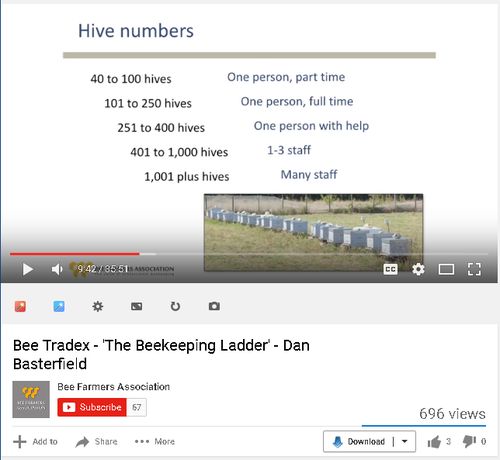Hi,
I have access to a piece of land, in the Midlands that I am thinking of developing into commercial Apiary. So as I am new to this I was wondering if anyone can answer some of my questions (I only have been keeping bees in the past as a hobby):
-Is there a general acreage to number of hives ratio. I was looking to have something like over 50 hives over time. Can they be all together or do they need to be separated. Also is there a distance they need to be from building and homes.
2- how many working person needs to look after 50 hives.
3 - how frequently do they needed to be visited.
4- do they need to be kept in doors in winter ( from my beekeeping experience I have always kept the hives outside, but I just wanted to check if its same for commercial ventures)
5 - how many centrifuges and extractors do you think I need for 50 hives. Also what do they costs usually? Are these very power hungry in terms of electricity. If so what kind of power requirement I will need. How long will take to extract the honey from 50 hives or more.
6- Do I needs to build a number of buildings/barns to hold the centrifuges and other equipment, do you have any ideas on the size and number.
5- how much honey does a typical commercial hive produce (From my beekeeping experience as a hobby my hive produces like 30-40 pounds, is this same yield for commercial hives).
6 - what is involved in the day to day bee keeping (i.e how is it different from just keeping bees as a hobby)
7- Do I need to plant flowers nearby.
I am sorry for all these questions but I am still a novice and I have no way to answer his questions and I am therefore grateful for any help you can provide, also I am grateful for any book recommendations for commercial beekeeping.
Thank you in advance for all you help.
Mike
I have access to a piece of land, in the Midlands that I am thinking of developing into commercial Apiary. So as I am new to this I was wondering if anyone can answer some of my questions (I only have been keeping bees in the past as a hobby):
-Is there a general acreage to number of hives ratio. I was looking to have something like over 50 hives over time. Can they be all together or do they need to be separated. Also is there a distance they need to be from building and homes.
2- how many working person needs to look after 50 hives.
3 - how frequently do they needed to be visited.
4- do they need to be kept in doors in winter ( from my beekeeping experience I have always kept the hives outside, but I just wanted to check if its same for commercial ventures)
5 - how many centrifuges and extractors do you think I need for 50 hives. Also what do they costs usually? Are these very power hungry in terms of electricity. If so what kind of power requirement I will need. How long will take to extract the honey from 50 hives or more.
6- Do I needs to build a number of buildings/barns to hold the centrifuges and other equipment, do you have any ideas on the size and number.
5- how much honey does a typical commercial hive produce (From my beekeeping experience as a hobby my hive produces like 30-40 pounds, is this same yield for commercial hives).
6 - what is involved in the day to day bee keeping (i.e how is it different from just keeping bees as a hobby)
7- Do I need to plant flowers nearby.
I am sorry for all these questions but I am still a novice and I have no way to answer his questions and I am therefore grateful for any help you can provide, also I am grateful for any book recommendations for commercial beekeeping.
Thank you in advance for all you help.
Mike






